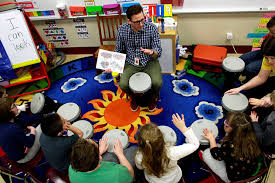Training Course on Arts Integration in Curriculum and Instruction
Training Course on Arts Integration in Curriculum and Instruction empowers educators to strategically design lesson plans and instructional strategies using arts integration.

Course Overview
Training Course on Arts Integration in Curriculum and Instruction
Introduction
Arts integration is a transformative educational approach that enhances student learning, creativity, and engagement by connecting the arts with core curriculum content. This method supports the development of critical thinking, communication, collaboration, and innovation skills—key competencies in the 21st-century classroom. By embedding visual arts, music, dance, and drama into subjects like math, science, language arts, and social studies, educators can foster deeper understanding, academic achievement, and a love for learning.
Training Course on Arts Integration in Curriculum and Instruction empowers educators to strategically design lesson plans and instructional strategies using arts integration. Participants will explore evidence-based practices, standards alignment, interdisciplinary teaching, and assessment strategies. They will also gain access to rich case studies and practical tools to implement arts-integrated learning experiences that are inclusive, culturally responsive, and standards-based.
Course Objectives
- Define arts integration and its relevance in modern education.
- Identify cross-curricular strategies using the arts to enhance student outcomes.
- Analyze 21st-century skills developed through arts integration.
- Apply creative teaching methods for diverse learning styles.
- Evaluate evidence-based practices for arts-integrated instruction.
- Create culturally responsive lessons that align with academic standards.
- Integrate visual arts, music, dance, and drama into the curriculum.
- Promote student engagement and retention through arts-based instruction.
- Design formative and summative assessments for arts-integrated learning.
- Use technology in arts integration for interactive learning.
- Foster collaborative classroom environments through arts-infused projects.
- Support inclusive education through differentiated, arts-based learning.
- Implement STEAM education principles via arts integration.
Target Audiences
- K-12 Teachers
- Curriculum Developers
- Instructional Coaches
- School Administrators
- Special Education Teachers
- Arts Educators
- Education Consultants
- Pre-Service Teachers
Course Duration: 5 days
Course Modules
Module 1: Foundations of Arts Integration
- Understanding the theory and practice of arts integration
- Historical and pedagogical foundations
- Benefits and challenges in various school contexts
- Exploring arts standards and content area alignment
- Differentiation through the arts
- Case Study: A primary school’s success using drama in language arts
Module 2: Visual Arts in Core Subjects
- Integrating drawing and painting in science and math
- Using art to visualize historical events
- Visual storytelling and literacy connections
- Classroom gallery walks and peer critique
- Creative expression in assessments
- Case Study: Visual journaling to enhance comprehension in middle school science
Module 3: Music and Movement for Learning
- Enhancing memory and recall through rhythm and song
- Music for emotional regulation and behavior management
- Using movement to teach math patterns and sequences
- Cultural learning through musical traditions
- Classroom setup for music-based activities
- Case Study: Teaching fractions through drumming patterns
Module 4: Drama and Role-Play in Instruction
- Building empathy and social-emotional learning through role-play
- Dramatic re-enactments in social studies
- Voice, tone, and communication skills
- Readers’ theatre to improve literacy fluency
- Classroom management in drama-based learning
- Case Study: Using historical simulation in high school history
Module 5: Dance Integration Strategies
- Kinesthetic learning in math and science
- Dance for cultural awareness and inclusion
- Storytelling through movement
- Supporting physical education goals through arts
- Structured improvisation and choreography
- Case Study: Teaching geometry through body shapes and motion
Module 6: Technology and Digital Arts Integration
- Digital drawing and animation in lessons
- Using video production for storytelling
- Integrating AR/VR with arts-based instruction
- Collaborative art projects using online platforms
- Assessment through digital portfolios
- Case Study: A middle school’s success with digital murals in civic education
Module 7: Assessment in Arts-Integrated Learning
- Types of assessment for arts integration
- Rubrics for creative student work
- Peer and self-assessment strategies
- Using portfolios and performance reviews
- Aligning assessments with academic standards
- Case Study: Using performance tasks to assess understanding in ELA
Module 8: Planning and Sustaining Arts Integration
- Developing year-long arts-integrated plans
- Engaging stakeholders and building support
- Accessing grants and resources for the arts
- Professional learning communities (PLCs) for collaboration
- Sustainability and advocacy for arts in schools
- Case Study: A district-wide implementation of an arts integration initiative
Training Methodology
- Interactive workshops with group activities
- Expert-led demonstrations and modeling
- Peer collaboration and lesson design labs
- Access to downloadable templates and toolkits
- Reflection journals and practice-based feedback
- Case-based learning for real-world application
Register as a group from 3 participants for a Discount
Send us an email: info@datastatresearch.org or call +254724527104
Certification
Upon successful completion of this training, participants will be issued with a globally- recognized certificate.
Tailor-Made Course
We also offer tailor-made courses based on your needs.
Key Notes
a. The participant must be conversant with English.
b. Upon completion of training the participant will be issued with an Authorized Training Certificate
c. Course duration is flexible and the contents can be modified to fit any number of days.
d. The course fee includes facilitation training materials, 2 coffee breaks, buffet lunch and A Certificate upon successful completion of Training.
e. One-year post-training support Consultation and Coaching provided after the course.
f. Payment should be done at least a week before commence of the training, to DATASTAT CONSULTANCY LTD account, as indicated in the invoice so as to enable us prepare better for you.